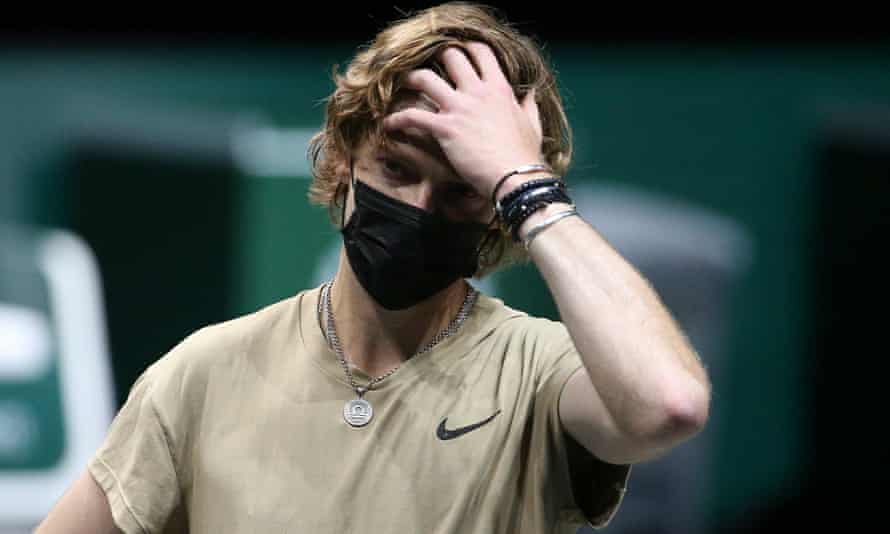As the Miami Open marched towards its climax, one of the many off-court discussions that have raged on during the event is the simple question of the sport’s attitude towards vaccination during the pandemic. Players were asked during the week about their stance, and a trend of ambivalence became clear.
For Andrey Rublev, the Russian world No 8, vaccination would make little difference to him as he would still have to remain in the tournament bubbles: “I don’t know,” Rublev said. “There is no reason. Just – I don’t know. Just by the feelings, because I never have any vaccine since I was a kid, so I don’t know. I feel OK with this way. I never had any problems with my health.”
The world No 5 Elina Svitolina said she was thinking about getting vaccinated until her friends suggested she should not. She framed her caution around the absence of any benefit to her professional career. The world No 8 Aryna Sabalenka made herself clear: “I don’t really trust it. For sure I don’t want my family to take it. If I will have to do it, I will really think twice before I take it.”
The WTA will find solace in the messages broadcast by its top three players. Ashleigh Barty hopes her family and boyfriend would be able to meet her on tour once they are able to get vaccinated. Naomi Osaka says she will receive one as soon as she is eligible. Simona Halep has already had her first dose. “I had the vaccine. So I can say I’m a little bit safer now,” Halep said.
They may all be products of their societies, but athletes also have the power to help affect them. In Russia, numerous polls have reported widespread ambivalence towards vaccination. Only 30% of respondents in a February poll reported readiness for vaccination, an 8% drop from December, while 62% said they were unwilling to be vaccinated. Just 19% of those aged 18‑24 were ready. Rublev is 23 and his stance is unsurprising.
Meanwhile Halep’s vaccination was very public, coordinated by the head of the national vaccination campaign, Valeriu Gheorghita. It has led to ample negative comments which in itself reaffirms the importance of one of the most prominent athletes in the country receiving the vaccine without problems.

Both the ATP and WTA tours later released separate statements noting their support for vaccination and educating their players, with the WTA stating it will not require players to vaccinate “as this is a personal decision which we respect”. This week has underlined that both tours have a duty to provide their players with more information about the vaccine and better educate them on the process.
As vaccines continue to be distributed around the world, sports governing bodies have been faced with a similar problem. Over the past few months in the National Basketball Association apprehension from players towards vaccines has been a prominent talking point. After the NBA’s widely reported attempts to recruit players for PSAs it seemed particularly notable that, rather than a player, the All-Star game saw the actor Michael B Jordan in discussion with the US vice-president, Kamala Harris.
As in the UK, a long history of discrimination against black people in healthcare has left its mark on the pandemic and the general caution towards medical services has translated to Covid‑19 vaccines. Since black people in the US have been hospitalised and died from the virus at disproportionately high rates, it is a dangerous combination. The NBA is a league populated by a majority of black professionals and their apprehension simply reflects their community but their voices also have the ability to positively influence communities at risk.
The sight of players receiving vaccines is becoming more normal and a handful of teams have already publicly acknowledged being vaccinated. More broadly, US leagues have taken steps to incentivise vaccination. The NBA is offering a relaxation of some protocols for vaccinated players and even full teams once 85% of players and coaches are vaccinated. On Wednesday the Wall Street Journal reported Major League Baseball will also incentivise vaccination.
Tennis, though, is in a different situation. For the past year the governing bodies have been driven by the whims of local and national governments around the world, some of which are as concerned with protecting the public from the travelling players as the opposite. But as different countries discuss restrictions for those who have had the jab, it seems only a matter of time before travel vaccination policies will leave players with a more pressing decision to make. It remains to be seen how hesitant they will be then.
This content first appear on the guardian
